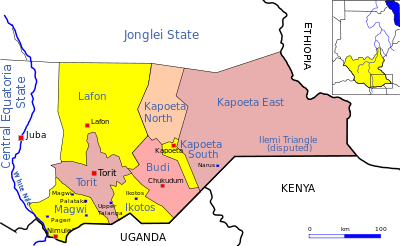Tennet people
The Tennet people ('Tenet' in early language survey[1]) are an ethnic group in South Sudan. Their language is also called Tennet. Their neighbors, the Lopit, refer to them as Irenge. In many respects, the Tennet culture resembles that of the Lopit, and most Tennet people can also speak Lopit, but they have maintained a strong ethnic identity, and among themselves they continue to speak Tennet.[2]
Location

The Tennet home area consists of five villages at the northern end of the Lopit Mountains, north of Torit in Eastern Equatoria state. Four of the villages are entirely Tennet,[3] but the fifth is part Tennet and part Lopit. In 1994, the Tennet population was estimated at about 4,000 people.[4]
Early history
The Tennet have an account of how they were once part of a larger group, which also included what are now Murle, Didinga, and Boya, the other members of the Southwest Surmic language family. Members of a hunting party speared an oribi, but after cooking it, they drank the broth themselves instead of giving it to the elders according to custom. A disagreement arose, and in the end, they separated, splitting into four smaller groups. The other three groups have similar stories.[5] Some estimates place this event in the early nineteenth century.[6]
The Tennet learned iron-working from the Lopit.[7] However, during Sudan's civil wars, blacksmith activity decreased.
Language
Tennet is a Nilo-Saharan, Eastern Sudanic, Surmic language. It has several of the features common in other Surmic languages: Implosive consonants, multiple strategies for marking number on nouns,[8][9] a marked nominative case system,[10] and VSO order but sentence-final question words.[11]
Culture
Economy
Like their neighbors the Lopit, the Tennet people practice swidden agriculture. They grow sorghum mostly on the plains below the villages, but they also cultivate fields on the mountainsides. They raise cattle, which are the main measure of wealth and are used for bride wealth, and they also hunt, fish, and raise goats and sheep. However, they are primarily dependent on sorghum, and drought can cause severe food shortages.
Governance
The Tennet communities are governed by the ruling age set, called the Machigi Looch, a system (and term) also used by their Lopit neighbors and other groups in the region.[12] Members of the monyomiji are young men who are old enough to participate in warfare (cattle raiding and defense of the village). They make decisions, but they are also held accountable by the retired monyomiji, the elders. A new group of monyomiji is initiated about every twelve years.
Music
Tennet music is pentatonic which is "Rugumon". Carved flutes are common around the villages, and drums are used during dances.
References
- ↑ Tucker (1956)
- ↑ Tennet entry in Ethnologue
- ↑ Randal (1998:219)
- ↑ Tennet entry in Ethnologue
- ↑ Arensen (1992)
- ↑ Focus On South: Facts About Eastern Equatoria State – Sudan Vision Daily. Retrieved 2011-11-24
- ↑ Dimmendaal (1989)
- ↑ Randal (1995:37)
- ↑ Arensen (1998)
- ↑ Randal (2000:70)
- ↑ Arensen, et al. (1997)
- ↑ South Sudan: Changing of the guard – Interpress Source News Agency. Retrieved 2011-11-24
Bibliography
- Arensen, Jonathan E. 1992. Mice are men: Language and society among the Murle of Sudan. International Museum of Cultures Publication, 27. Dallas: International Museum of Cultures.
- Arensen, Jonathan, Nicky de Jong, Scott Randal, Peter Unseth. 1997. "Interrogatives in Surmic Languages and Greenberg's Universals," Occasional Papers in the Study of Sudanese Languages 7:71–90. Nairobi: Summer Institute of Linguistics.
- Arensen, Jonathan E. 1998. "Murle categorization" in Gerrit Dimmendaal and Marco Last (eds.), Surmic Languages and Cultures. 181–218. Köln: Rüdiger Köppe Verlag.
- Dimmendaal, Gerrit. 1989. "On Language Death in Eastern Africa", in Dorian, Nancy C. (ed.), Investigating obsolescence: Studies in language contraction and death (Studies in the Social and Cultural Foundations of Language 7.) Cambridge: Cambridge University Press
- Randal, Scott. 1995. "Nominal morphology in Tennet," M.A. thesis, University of Texas at Arlington.
- Randal, Scott. 2000. "Tennet's ergative origins," Occasional papers in the study of Sudanese languages. 8:67-80. Nairobi: Summer Institute of Linguistics.
- Tucker, Archibald N. & Margaret A. Bryan. 1956. The non-Bantu languages of northeastern Africa. "Handbook of African languages, 3." London: Oxford University Press for International African Institute.
External links
- Ethnologue information on Tennet
- Focus On South: Facts About Eastern Equatoria State – Sudan Vision Daily.
- South Sudan: Changing of the guard – Interpress Source News Agency.
